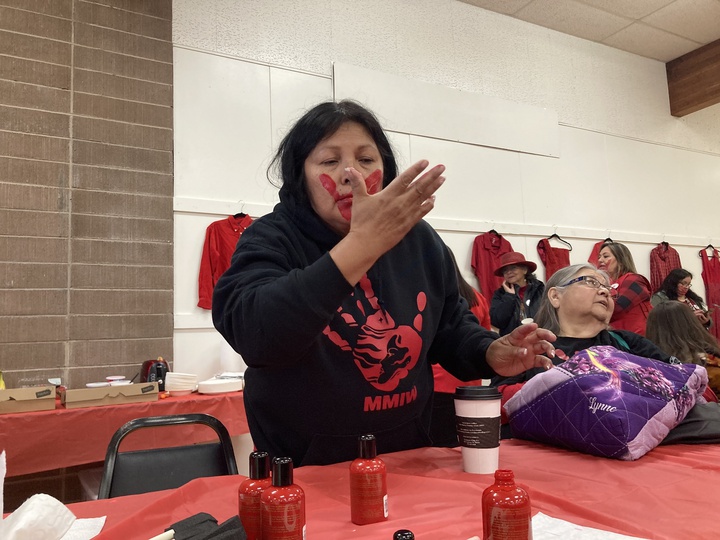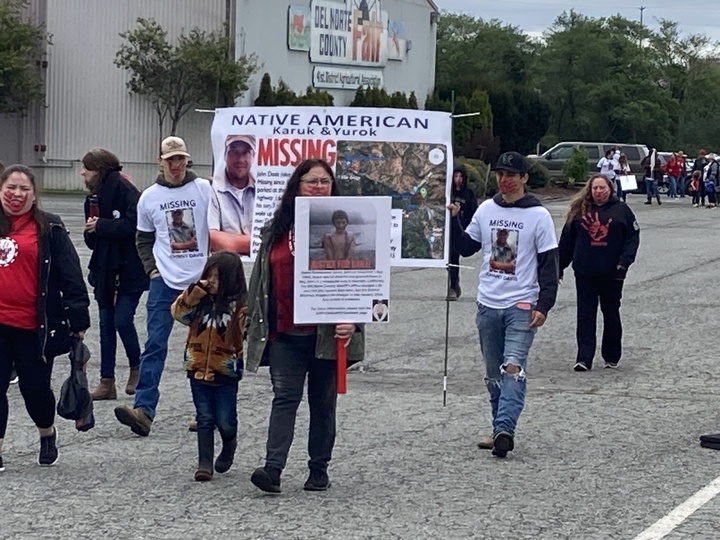Jessica Cejnar Andrews / Friday, May 5, 2023 @ 4:35 p.m. / Community, Crime, Tribal Affairs
'We're Not Giving Up'; Tolowa Dee-Ni' Nation Walks For Missing & Murdered Indigenous People

Juliana Doerner places a red handprint over her mouth to shed light on Missing and Murdered Indigenous People at a Tolowa Dee-ni' Nation awareness walk Friday. | Jessica C. Andrews
Jeannie and John Davis still haven’t given up searching for their son, Johnny.
The 48-year-old Karuk and Yurok man went missing on Oct. 21, 2021 when he and his son were forced to pack up their camp due to rising waters on Bureau of Land Management land near Highway 162 in Mendocino County.
Nearly two deer seasons since, the McKinleyville couple say they’ve “sold everything” in their ongoing quest for answers as to what happened to Johnny Davis. On Friday, they were in Crescent City sharing their story at an awareness walk hosted by the Tolowa Dee-ni’ Nation honoring those who are “missing and murdered, but not forgotten.”
“We want to let people know we’re not giving up,” Jeannie Davis told the Wild Rivers Outpost. “As long as we’re able to hang posters, we’re not giving up.”
Johnny Davis’s wasn’t the only face emblazoned on a sign and held aloft for motorists to glimpse as they made their way down U.S. 101 through Crescent City. Virgil Owen Russell, Steve Myers and Dante Romannose-Jones were others.
Dante was 13 when he was shot and killed in Klamath in 2015. Though then-District Attorney Dale Trigg initially charged a 16-year-old with Dante's homicide, he dropped the charges citing lack of evidence, according to a Change.org petition.
Eight years later, his friends and family have yet to see justice done.
“Witnesses have not come forward,” said Lisa Richards, who was walking on Friday for Dante and Myers, who was killed in Smith River in 2018. “Put fear aside and bring people to justice!”
Richards, the Davises and dozens of others wore red and painted red handprints across their mouths during the Tolowa Dee-ni’ Nation’s awareness walk. It was one of several demonstrations held across the U.S. commemorating May 5 as a National Day of Awareness for Missing and Murdered Indigenous Persons.
“The powerful image of the red handprint across one’s face has come to symbolize the meaning of Missing and Murdered Indigenous Peoples movement as a way to represent the thousands of women that have been silenced,” Tolowa Dee-ni’ Nation PR Manager Emily Reed said. “It has been said that the color red transcends the physical world and calls to the ancestors in the spiritual world. Beyond politics and detective work, the red handprint has found its way into art and fashion as a way to raise awareness. I know our ancestors and our loved ones can see us here today.”

Lisa Richards (center) walks for Dante Romannose-Jones, a Klamath boy who was shot and killed at 13 in 2015. His killer was never brought to justice. | Jessica C. Andrews
Reading out statistics from the National Criminal Justice Center, Reed told her neighbors that there were 5,293 MMIP incidents in 2020.
The victims in 4,244 of those cases were younger than 20 and only 694 of those 5,293 cases were logged into a federal database, Reed said. Of those 694 cases, 578 — or 83 percent — are unsolved, she said.
“Homicide is the third leading cause of death among indigenous people,” Reed said. “We deserve better. Every single case out of those 5,293 cases should have been logged into that database system. It should not be a pick-and-choose situation. Every case and indigenous person matters.”
In addition to shedding light on the overall MMIP crisis, the Tolowa Dee-ni’ Nation’s awareness walk focused on two bills making their way through the California Legislature — AB 273 and AB 44, both proposed by San Bernardino area assemblyman James Ramos.
AB 273 focuses on missing foster children and requires welfare services to consider the safety of the child before returning them to the same caregiver, according to Kathleen Daignault, Tolowa Dee-ni’ Nation’s victim services coordinator.
AB 44 would give tribal courts and tribal law enforcement agencies access to the California Law Enforcement Telecommunications System to look for missing people, Daignault told the Wild Rivers Outpost.
Though it’s been involved in shedding light on the MMIP issue before, the Tolowa Dee-ni’ Nation opened its awareness walk to the entire Del Norte County community on Friday. It comes ahead of a larger effort to create a tribal community response plan to the issue that the Tolowa Dee-ni’ Nation is spearheading and wants to get local law enforcement involved in.
Daignault said the tribe is working on another event in November, inviting local law enforcement as well as the Department of Justice, the Bureau of Indian Affairs and the California Indian Law Coalition. She said the Crescent City Police Department will also be taking DNA swabs to help people potentially reconnect with a loved one.
Reed pointed out that sharing information and collaboration between tribal communities and other agencies is important.
“We know that time is everything in situations like this,” she said.
CLICK TO MANAGE